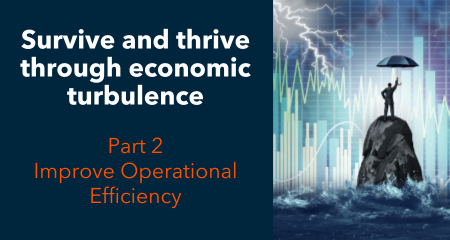Note: This is part two of a three-part blog series about positioning your consumer reporting agency (CRA) or background screening company to survive and thrive through the current economic turbulence and the turbulence sure to come. Today we’ll explore ways to maximize efficiency to make the most of your business’s resources and time in any economy.
(Revisit part one — the background screening industry outlook for 2023-24 — here.)
Operators for CRAs only really have two modes.
When the business is growing, you’re consumed with scale. How can you take on more volume, get more done, and bring on more staff to keep up with the demand?
When demand plateaus or declines, the focus shifts to efficiency. How can you squeeze the most value from your current resources to maximize what little revenue is coming your way?
In a sense, these are just two sides of the same coin. After all, improving efficiency is always a good idea. The operational efficiency improvements you make during a downturn lay the groundwork for a quick ramp-up when volume spikes.
Economic Uncertainty Calls for Efficiency
As we covered in our last post, no one knows where the economy is headed over the next few years. A recession could be looming, and large publicly traded CRAs do not expect significant growth. Nevertheless, the national quit rate — traditionally a demand indicator for pre-employment background screening — is hovering around 2.5%.
Some experts believe we are in the midst of a “rolling recession,” which is hitting some sectors hard while others flourish.
For CRAs, this uncertain economic climate requires planning for multiple eventualities, so now is the perfect time to streamline your operations.
Where to Find Operational Efficiencies in Your CRA: 4 Focus Areas
During a recent webinar on surviving and thriving through economic turbulence, InformData COO Bill Wilder outlined four areas to zero in on when searching for opportunities to improve operational efficiency at your CRA or background screening company:
1. Operational Innovation
“When we’re growing revenue, a lot of times we build processes to make sure we get that revenue in the door,” Wilder said. “It’s not necessarily as efficient as it needs to be.”
CRAs can take advantage of leaner times to refine these processes to maximize efficiency and profit. You even see large companies, like Facebook, doing this, in the current economy.
Mark Zuckerberg made clear: 2023 would be the year of efficiency at Meta Platforms. "Meta's Year of Efficiency," the company's chief executive called 2023 in a blog post last month. The pivot in strategy, which followed "rapid revenue growth year after year," stems from the fact that the "world economy changed, competitive pressures grew, and our growth slowed considerably," Zuckerberg explained.
“I would spend a lot of time and energy around ways to innovate within the world of operations to remove time and effort, circular loops, things like that,” Wilder told the webinar attendees.
For example, here at InformData, we recently completed a kaizen event (the idea that small, ongoing positive changes can reap significant improvements) around the time and effort costs of vendor invoice management. But you don’t need to be a kaizen devotee to find inefficiencies; any form of process mapping will do.
“Get very hyper-focused at studying your processes, the flow of work, the flow of activity behind the scenes, and look for inefficiencies,” Wilder advised. “If you have labor that isn’t as busy as they used to be, it’s a great time. Pull them into a conference room. Ask the front lines where inefficiencies happen because that’s usually where the answers are.”
2. Controls: Processes for Managing Cause to Achieve Effect
We often think of controls in terms of financial controls, but controls can also be an operational concern. From an operational standpoint, controls are procedures or safeguards that dictate how to handle certain situations.
The right controls eliminate guesswork and provide an efficient path forward — or save your organization from excessive spending and labor.
“Think about the processes and procedures when a client wants some customized operation,” Wilder said during the webinar. “Do you always just say ‘yes,’ or do you have some sort of control to assess the situation, determine whether you can do the customization, and, frankly, whether you might need to charge the client more?”
Insufficient or ineffective controls can gum up your operations as much as a complete lack of controls. So, don’t assume you’re running at maximum efficiency because you have some controls in place. Take the opportunity to assess and boost the efficacy of all your current controls, and look for places to insert new controls, Wilder recommended.
3. The Client Interaction Burden
Every CRA has experienced that one client that always seems to require special handling, extra touches, and more effort. “Now is the time to really go back and assess, ‘What is the burden that client is putting on you,’” Wilder said.
High-touch clients can translate into significant costs and labor demands. Once you understand how certain clients are affecting your operations, you can initiate productive dialogues around altering your processes, increasing pricing for those clients, or decreasing customization.
“It’s never easy having those conversations with clients,” Wilder acknowledged, but it may be worth enduring some discomfort in the end. “You may have some clients that, frankly, aren’t even as remotely profitable as you think they are.”
4. Vendor Strategy
“Operations 101” teaches us never to put our eggs in one basket. But this conventional wisdom may not hold up during a downturn — at least not when managing vendors.
“When you go into recessions, you actually do want to start consolidating vendors so that you can continue to have the power of the pen to influence the vendors so they don’t raise the prices on you as much, or so that your work continues to stay top of their line,” Wilder said.
The current economic uncertainty is ideal for revisiting your vendor strategy.
“Look for situations where you’ve overly fragmented your work with too many vendors, where you just don’t have enough critical mass with a vendor to influence them,” Wilder told the webinar attendees. “Find ways to consolidate that.”
(Read more about the benefits of outsourcing employment verification here.)
Operational Efficiency Goes Hand-In-Hand With Innovation
Improving operational efficiency in the areas described above will have your CRA running lean and mean, which might be sufficient for surviving a recession. But if you want your background screening business to thrive, you need to be willing to experiment with new revenue streams, try new services, and create new opportunities.
In part 3 of this four-part blog series, we’ll look at some innovative ways to grow your business in any economic environment.
Check back soon for updates (or subscribe here).



